Islamophobia/Anti-Muslim Hatred Definition Working Group – call for evidence
CLICK HERE TO COMPLETE: https://forms.office.com/Pages/ResponsePage.aspx?id=EGg0v32c3kOociSi7zmVqI6tIfR9NoRNi6VcrK9V665UQTdRVzRMM0I4UTA0R0ZCNzBJQ0s4TVNYMS4u
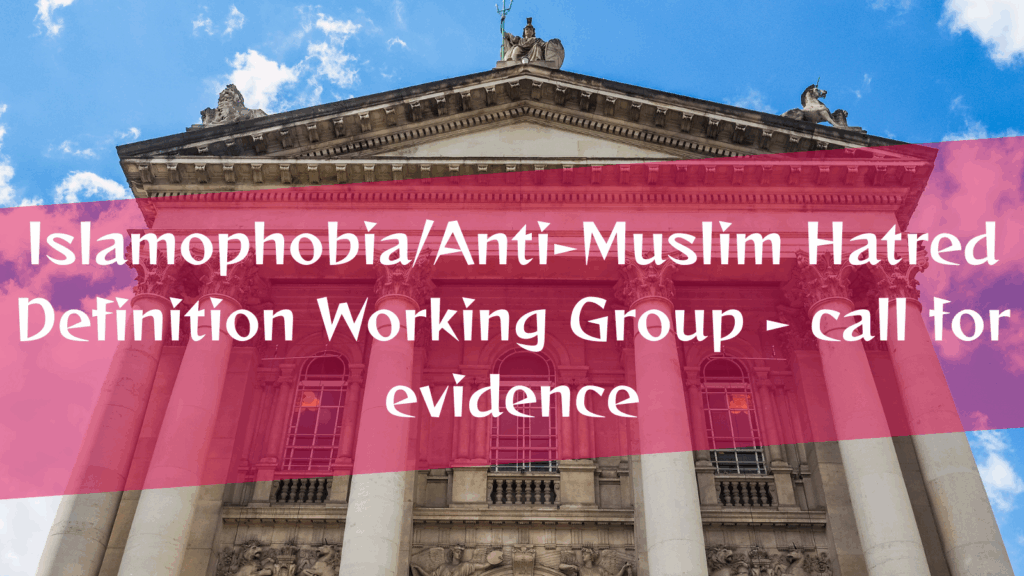
The UK Government’s independent working group on an Anti-Muslim Hatred/Islamophobia definition is seeking views from organisations and individuals on the Government adopting a definition of Anti-Muslim Hatred/Islamophobia.
British Muslims hold a diverse range of opinions, identities, beliefs, and backgrounds. This diversity helps to enrich the fabric of UK society. There are countless examples of Muslim citizens achieving excellence across society – from entrepreneurs to public servants, from sports men and women to musicians and artists.
The UK Government has a responsibility to ensure that people of the UK receive equal treatment and can freely express their views, beliefs, and sense of identity. Sadly, this is not always the case; too many British Muslims have faced discrimination and hatred due to their religion.
Anti-Muslim hatred/Islamophobia can also impact communities that are perceived to be Muslim. There are often cultural markers which are adopted by wider faith communities like Sikh, Hindu, Jain and Buddhists which are used to attack communities that are mistakenly identified as Muslim. This is also true of people of no faith. The Anti-Muslim Hatred/Islamophobia Definition Working Group will provide advice to the Deputy Prime Minister and Secretary of State for Housing, Communities and Local Government on appropriate and sensitive language to describe, understand and define unacceptable treatment, prejudice, discrimination and hate targeting Muslims or anyone who is perceived to be Muslim. This should include advice regarding the merits of government adopting a non-statutory definition of unacceptable treatment of Muslims and anyone perceived to be Muslim, including what a proposed definition should be.
The Group’s proposed definition will be non-statutory and will provide the government and other relevant bodies with an understanding of unacceptable treatment and prejudice against Muslim communities. Any proposed definition must be compatible with the unchanging right of the UK’s people to exercise freedom of speech and expression – which includes the right to criticise, express dislike of, or insult religions and/or the beliefs and practices of adherents.
Any advice that the group gives to Government will be private and will not be made public. Further information on the group can be found in its terms of reference: https://assets.publishing.service.gov.uk/media/67e12094d8e313b503358c7c/Anti-Muslim_Hatred_Islamophobia_Definition_Working_Group_Terms_of_Reference_March_2025.pdf

Further information
This call for evidence will help the Group to make evidence-based recommendations for Ministers to consider. This call for evidence seeks views on the following topics: 1. What terminology to use 2. The need for a definition 3. Whether racism should be a component of any new definition 4. What should be included within a definition 5. Examples of anti-Muslim hatred/Islamophobia.
This call for evidence will run for 4 weeks and it will close on 13 July. All responses will be anonymous unless you choose to disclose information about you or your organisation.
If you are unable to access the response form, for example due to a disability, please contact definitionsecretariat@communities.gov.uk for an alternative response form.
Privacy notice
The following notice explains your rights and provides the information you are entitled to under UK data protection legislation when you engage with this Call for Evidence.
The data controller The Ministry of Housing, Communities and Local Government is acting as the Data Controller for this Call for Evidence. The Data Protection Officer can be contacted at dataprotection@communities.gov.uk.
What personal data we are collecting and why Your personal data is being collected as part of your response, if you are responding as an individual. Personal data might be disclosed in individual or organisational responses, where you chose to do so. The following personal data and special category personal data may be collected for this purpose, where disclosed by you:
- Name and contact details
- Personal data revealing religious or philosophical beliefs
- Personal data revealing race or ethnic origin
- Personal data relating to your age
- Personal data relating to your sex
- Personal data about anyone else, where you might disclose this
Lawful basis for processing the data The UK General Data Protection Regulation (UK GDPR) and Data Protection Act (DPA) 2018 sets out when public authorities are lawfully allowed to process your data. The lawful basis that applies to the processing of public data as part of the Call for Evidence is:
- Article 6(1)(e) of the UK GDPR “processing is necessary for the performance of a task carried out in the public interest or in the exercise of official authority vested in the controller”.
Where we may process “special category” personal data – e.g. sensitive data that reveals racial or ethnic origin, religious or philosophical beliefs – our lawful basis that applies to this processing is:
- Article 9(2)(g) of the UK GDPR: “the processing of special categories of data is necessary for reasons of substantial public interest on the basis of UK law”.
With whom we will be sharing the data The data will be shared with the Anti-Muslim Hatred/Islamophobia Definition Working Group and it will be used for the purposes of the Islamophobia/Anti-Muslim Hatred definition working group only.
Your rights, e.g. access, rectification, erasure The data we are collecting is your personal data, and you have rights that affect what happens to it. You have the right to: a. know that we are using your personal data – we have explained why and how in this notice, but if you have any questions on this please contact dataprotection@communities.gov.uk b. see what personal data we have recorded linked to your name/email address c. ask to have your personal data corrected, and to ask how we check the information we hold is accurate d. ask to have use of your personal data temporarily restricted, where e.g. this might be inaccurate e. complain to the ICO.
Automated decision making (without human involvement) We will not use your personal data for any automated decision making.
How your data will be stored and for how long we will keep your data Your personal data will be saved on our secure government IT system, and it will be stored in line with our Retention and Disposal Policy.
Complaints and more information When we ask you for information, we will keep to the law, including the Data Protection Act 2018 and UK General Data Protection Regulation. If you are unhappy with the way the Department has acted, you can make a complaint. If you are not happy with how we are using your personal data, you should first contact dataprotection@communities.gov.uk. If you are still not happy, or for independent advice about data protection, privacy and data sharing, you can contact: The Information Commissioner’s Office
Wycliffe House
Water Lane
Wilmslow, Cheshire, SK9 5AF Telephone: 0303 123 1113 or 01625 545 745
https://ico.org.uk/
Disclosure and support
Please do not include any accusations or allegations of illegal activity against individuals. This is not a platform to report crime. Should you need to report a crime please do so through the appropriate channels.
If you require any support, or find any questions within the call for evidence upsetting, please consider contacting a support helpline:
- Victim Support 24/7 call: 08 08 16 89 111
- Samaritans – Call: 116 123
- CALM – 5pm to midnight. Call: 0800 58 58 58
- Papyrus 9am to midnight. Call: 0800 068 41 41 or text 07860 039967
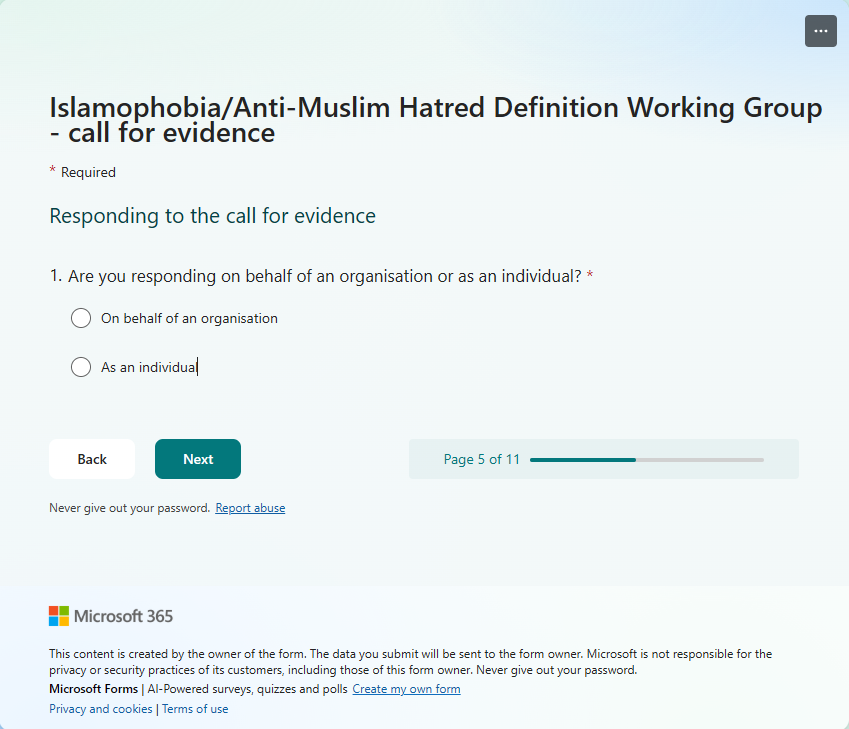
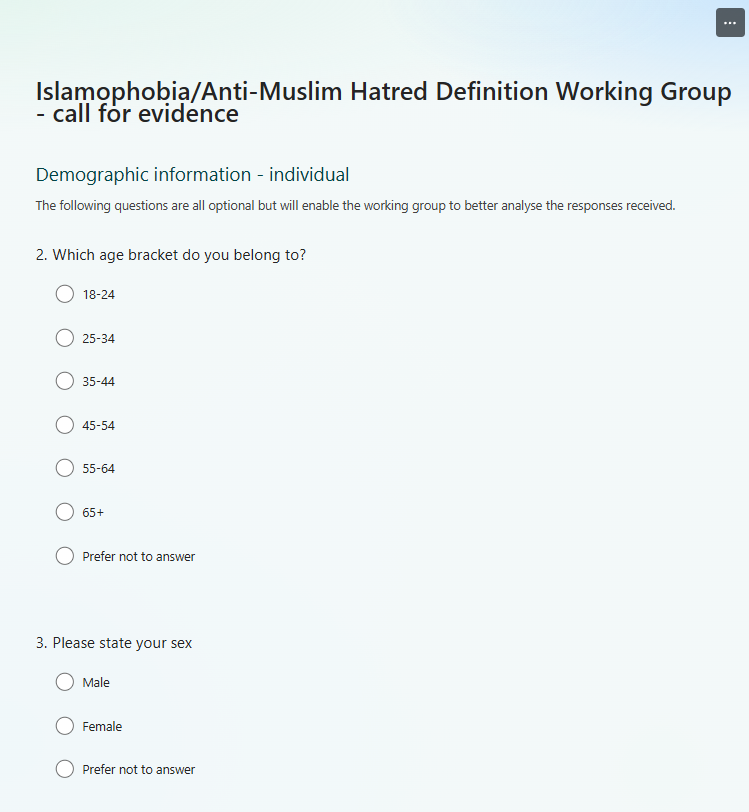
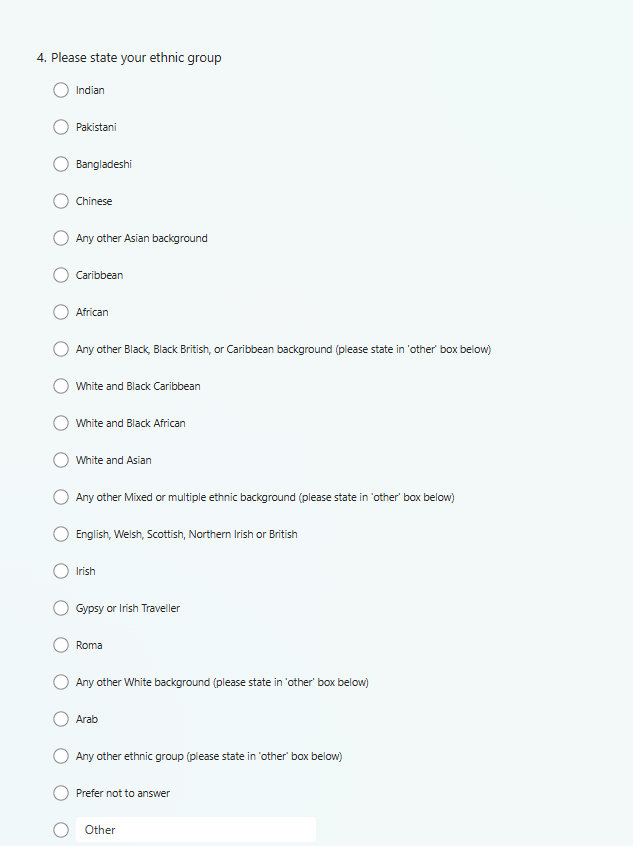
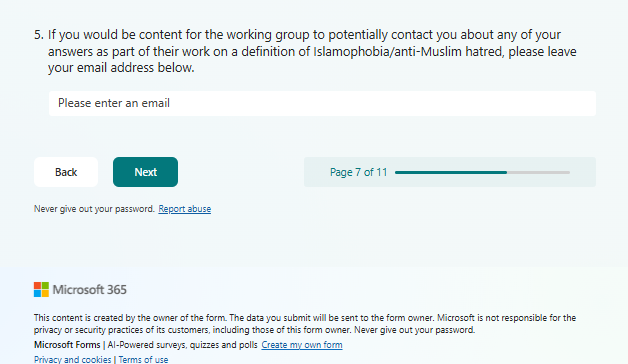

Q.6: When referring to discrimination, prejudice, bigotry, hatred or violence directed at Muslims, which term do you think should be used? For instance, ‘Islamophobia’, ‘anti-Muslim hatred’, ‘anti-Muslim racism’, ‘anti-Muslim prejudice’, ‘Muslimophobia’ etc.
Q.6 ANSWER: The term “anti-Muslim hatred” is the best of the options.
Q.7: Please tell us your reason for suggesting this term.
Q.7 ANSWER: The term “anti-Muslim hatred” is preferred as it directly addresses hostility toward individuals based on their Muslim identity without conflating it with criticism of religious beliefs or practices, which risk stifling free speech. “Islamophobia” is ambiguous, can be misused to shield harmful practices, as seen in the Casey Review, where fear of being labelled racist hindered investigations. Existing equality laws already protect against discrimination, and a specific term like “Islamophobia” could elevate one group, fostering division.

Q.8: Do you think the UK Government should adopt a definition of Anti-Muslim Hatred/Islamophobia? (any definition would be non-statutory)
Q.8 ANSWER: NO
Q.9: Please could you tell us more about why you think that?
There is no need for a specific definition of Anti-Muslim Hatred/Islamophobia. UK equality laws already protect against religious discrimination. A non-statutory definition risks prioritising one group, causing division. The Casey Review (2016) showed fear of “Islamophobia” accusations hindered grooming gang investigations, harming public safety. “Anti-Muslim hatred” is clearer but unnecessary, existing laws suffice. A new term could stifle free speech and debate, as seen with the APPG definition’s criticism. No religion or belief can be above criticism in a free society.

Q.10: Do you think Anti-Muslim Hatred/Islamophobia is also a form of racism?
Q.10 ANSWER: NO
Q.11: Please could you say more about why you think that?
Anti-Muslim hatred is not racism as it targets religious belief, not race. Muslims are diverse ethnically; conflating religion with race muddles both. The Equality Act 2010 distinguishes religion from race, protecting both without overlap. The Casey Review (2016) showed how fear of racism accusations hindered grooming gang probes, suggesting misuse of such terms harms justice. Critics like the National Secular Society warn “Islamophobia” as racism risks stifling religious critique. Other critics stress separating faith-based hatred from racial prejudice to avoid division and protect free speech. Existing laws suffice without redefining as racism. We won’t benefit from importing divisive political ideas or terminology, recent years has demonstrated this quite clearly.

Q.12: Should any of the aspects below feature in a definition of Anti-Muslim Hatred/Islamophobia? Please tick all that apply.
Q.12 ANSWER: What Anti-Muslim Hatred/Islamophobia does not include
Q.13: If you wish to, please can you give an example(s) of anti-Muslim hatred/Islamophobia that you have witnessed, experienced or read about over the last two years? Please refrain from disclosing personal information about other people involved in these examples – such as their name, address.
Instead of witnessing anti-Muslim hatred, I’ve observed the opposite: false accusations of “Islamophobia” used to silence legitimate concerns. A religious studies teacher at Batley Grammar School was forced into hiding in 2021 after showing a caricature of the Prophet Muhammad during a class, he and his family are still in hiding.

